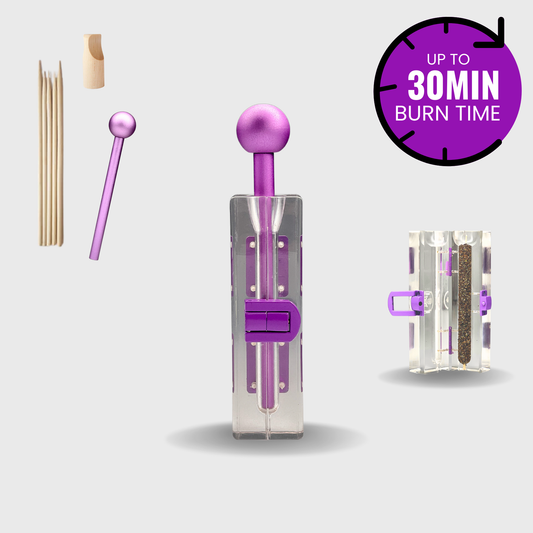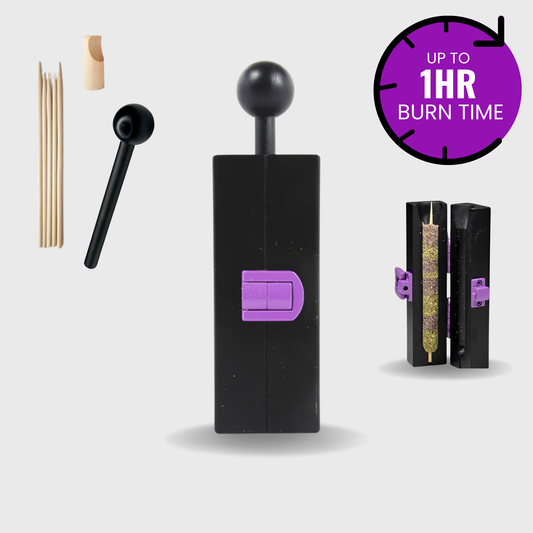⬇️ Prefer to listen instead? ⬇️
- A 2011 study showed CBD significantly reduced anxiety during public speaking challenges.
- 79.2% of patients in a 2019 trial reported less anxiety after one month of consistent CBD use.
- CBD interacts with serotonin receptors, suggesting biological pathways for stress and anxiety relief.
- Individual factors like genetics, diet, and stress levels influence CBD's effectiveness.
- Full-spectrum CBD may offer stronger effects due to the “entourage effect” involving multiple cannabinoids.
What Is CBD and How It Interacts With Your Body
CBD, short for cannabidiol, is a non-intoxicating compound derived primarily from the hemp variety of the Cannabis sativa plant. Unlike tetrahydrocannabinol (THC), which produces the classic "high" associated with marijuana, CBD is non-psychoactive—meaning it doesn’t alter your mental state or perception. Instead, CBD has become known for its potential therapeutic effects, especially around promoting calmness, easing discomfort, and enhancing overall wellness routines.
How does it work? The magic lies in the endocannabinoid system (ECS), an internal regulatory network composed of cannabinoid receptors (CB1 and CB2), naturally produced endocannabinoids, and enzymes. This system plays a key role in maintaining bodily homeostasis—regulating things like sleep, mood, appetite, stress, and immune response. CBD doesn’t directly bind to CB1 or CB2 receptors like THC does. Rather, it indirectly influences them and interacts with other important receptor systems, such as serotonin receptors like 5-HT1A, which are deeply involved in mood and stress regulation.
Because of this interaction, CBD for relaxation and stress relief is becoming an increasingly popular natural option. It helps bring your body back into balance without forcing a "numb" or drowsy state. Think of it as encouraging your body's built-in stress buffer to function more efficiently.

What Science Actually Says About CBD for Relaxation
The proof is starting to build—CBD’s role in promoting relaxation is being taken more seriously in scientific and medical communities. A growing number of peer-reviewed studies have uncovered compelling evidence supporting its use for stress and anxiety, although not without limitations.
- In a notable 2011 study, researchers tested CBD's effects on people with social anxiety disorder undergoing a simulated public speaking test. The results? Participants who took CBD experienced significantly reduced anxiety, cognitive impairment, and discomfort compared to those taking a placebo.
- A much larger and more heterogeneous 2019 case series looked at the therapeutic application of CBD in routine clinical practice. Among the 72 participants, 57 reported decreased anxiety levels within the first month, representing 79.2% of the total studied group.
- CBD’s impact on serotonin receptors, especially 5-HT1A, has been shown in preclinical studies to mimic the effect of anti-anxiety medications (like SSRIs), albeit in a gentler, more holistic way.
While these studies are promising, it’s important to acknowledge that many used small sample groups or short-term assessments. Long-term studies with larger populations—and placebo comparisons—are still lacking. Some mental health professionals also point out the possible placebo effect, especially with growing public excitement surrounding CBD-based wellness. But even so, when taken regularly and paired with mindful routines, CBD for anxiety and stress appears to deliver authentic, measurable benefits for many users.

Why CBD Doesn’t Work the Same for Everyone
CBD might seem like a wonder-working compound for some, and “meh” for others. This inconsistency is mostly due to individual biology and situational factors. Here are a few variables that influence how CBD affects you
Body Chemistry and Metabolism
Just like how caffeine hits differently for everyone, your metabolism profoundly impacts how you process CBD. Factors like your liver enzymes, age, diet, hydration, and even hormone levels dictate how efficiently your body absorbs and utilizes CBD.
Baseline Stress and Anxiety Levels
If you're dealing with chronic anxiety or long-standing stress, it may take time for CBD to deliver noticeable improvements. People with acute or situational stress might feel results quicker than those whose nervous system has been in overdrive for years.
Genetics and Endocannabinoid Tone
Some people naturally produce more internal cannabinoids or have more sensitive ECS receptors. If your endocannabinoid tone is low, CBD might have to do more heavy lifting initially before homeostasis is restored.
Tolerance and Sensitivity to Cannabinoids
If you’ve frequently consumed cannabis products, your body might need higher CBD doses for noticeable effects. Conversely, first-time users or THC-sensitive individuals may feel even low doses more profoundly.
CBD Product and Delivery Method
Sublingual oils, vaping, edibles, topicals—they all work differently. Edibles might take up to 2 hours to kick in and last longer, while tinctures often hit within 30 minutes. Smoking or inhaling gets it into your system fastest—but also wears off quicker.

Busting Myths: What CBD Can and Can’t Do
As with any trend, CBD is surrounded by myths. Here’s a reality check
Myth: CBD is an instant miracle cure.
Truth: Most people see results after consistent use over days or weeks.
Myth: CBD will knock you out cold.
Truth: It typically encourages calmness without heavy sedation—especially at standard doses.
Myth: If you don’t feel it right away, it doesn’t work.
Truth: CBD often requires a buildup effect depending on delivery method and your body’s absorption rate.
Myth: CBD replaces professional care.
Truth: It’s a helpful tool but not a substitute for therapy, medication, or medical advice.
Understanding CBD for anxiety and relaxation means approaching it as a supportive element—not a fix-all.
Product Types That Support Relaxation Best
Different types of CBD deliver different experiences, and choosing the right format depends on your lifestyle, stress patterns, and when you want relief.
Tinctures and Oils
These are fast-acting and great for targeted timing—think pre-meeting, post-work wind-down, or just before bed. You place the oil under your tongue (sublingually), which allows it to absorb through the mucous membranes in 15 to 45 minutes.
Edibles
CBD gummies, chocolates, or soft chews are discreet and taste great, but they take longer to digest (up to 2 hours). However, the calming effect lasts longer than other forms because the compound is metabolized more slowly through your digestive system.
Topicals
While CBD lotions or balms won’t contribute to systemic relaxation, they’re effective for reducing localized muscle tension and topical inflammation. Apply to the temples for headaches, neck for tightness, or shoulders for end-of-day stress relief.
Smokable CBD Flower
Smoking or vaping offers the fastest effects—often within minutes—and is ideal if you need quick stress relief. Many people combine CBD flower with THC flower to balance the buzz and stay grounded during their session.
The Dosage Factor: Start Low, Go Slow
Getting the dosage right means the difference between subtle calm and no effect—or worse, unexpected drowsiness.
General Guidelines
- Beginner dosage: 10–15 mg once or twice daily.
- Moderate stress support: 20–40 mg per day.
- Chronic anxiety or sleep issues: May require 50+ mg daily, under professional guidance.
Factors like weight, metabolism, and symptom severity play roles in determining the "sweet spot." Always journal how each dose feels and allow a 1–2 week trial period before increasing amounts.
Consistency matters more than occasional high doses to get the best CBD stress relief over time.
Understanding Full-Spectrum, Broad-Spectrum & Isolate
When browsing CBD products, you’ll usually see these three types
Full-Spectrum CBD
Contains all natural cannabinoids, terpenes, and trace amounts of THC (under 0.3%). This combo may enhance effects through the "entourage effect"—when multiple compounds work synergistically for greater impact.
Broad-Spectrum CBD
Similar to full-spectrum but with zero THC, making it ideal for anyone who is THC-sensitive or subject to workplace drug testing.
CBD Isolate
Pure CBD with no other cannabinoids or plant compounds. While effective, it doesn't benefit from the entourage effect but offers a precise option for users needing specific dosages without added variables.

Choosing the Right CBD Product for Your Chill Routine
The CBD market is still loosely regulated, so choosing the right brand is critical to avoid wasting money or risking side effects.
Look For
- Certificates of Analysis (COAs): Third-party lab testing for CBD quantity, THC levels, and screening for contaminants.
- Clear labeling: Doses per serving, total volume, and ingredients should be transparent.
- Customer reviews and origin transparency: Look for hemp grown in the U.S. under organic standards.
- Avoid artificial additives: Ingredients should be pronounceable and simple—especially if you’re ingesting it.
Legal tip: Under federal law (2018 Farm Bill), CBD products must contain under 0.3% THC to be considered legal—but always confirm your state’s laws.
Immediate Effects vs. Consistent Benefits
You might feel initial calmness from your first dose, especially with fast-delivery forms like vapes or tinctures. However, most long-term benefits of CBD—like better sleep quality, reduced baseline anxiety, and improved focus—tend to appear with consistent use.
Think of CBD as building up calm-currency in your system. More days = more stability.

Safety & Side Effects (The Responsible Take)
Although generally safe, CBD isn’t risk-free. According to the WHO report, it's well-tolerated by most users, but here's what to watch
Potential Side Effects
- Dry mouth
- Fatigue or drowsiness
- Gastrointestinal discomfort
- Changes in appetite
Drug Interactions
CBD may inhibit some liver enzymes involved in metabolizing medications, including
- Blood thinners
- Antidepressants (SSRIs)
- Antipsychotics
- Epilepsy meds
If you're on any prescriptions, always consult your healthcare provider first.

CBD in Smoking Rituals: A Wellness-Enhanced Sesh?
For cannabis lovers, adding CBD to your session can balance the whole experience and make it feel better
Popular Pairings
- CBD + THC flower: Counteracts paranoia or over-stimulation from THC.
- Pre-roll rituals: Take CBD oil before smoking for enhanced body relaxation.
- Topical relaxation: Apply a balm to your temple or shoulders while your sesh settles in.
- Group vibes: CBD edibles mellow everyone out without clouding social presence.
Smokers are increasingly realizing that blending wellness with ritual can enhance both connection and comfort.

Should You Talk to a Healthcare Provider First?
Absolutely—especially if
- You’re on medications with known enzyme interactions (like blood thinners or antidepressants).
- You have liver disease, kidney issues, or immune-compromising conditions.
- You experience mental health issues like bipolar, schizophrenia, or major depression.
Doctors can help guide dosage and monitor interactions. CBD is powerful—but should complement medical care, not replace it.
Final Takeaways: Is CBD Right for Your Relaxation Routine?
CBD offers a compelling option for modern relaxation—one rooted in biology, plant medicine, and neuroscience. While not a miracle cure, users consistently report real benefits like sleeping easier, feeling less anxious, and enjoying social moments more peacefully.
To make it work for you, keep these things in mind
- Everyone's body responds differently.
- Use high-quality products with verified lab testing.
- Choose formats that align with your lifestyle and timing needs.
- Set realistic expectations—and look for consistency over quick-fixes.
Trying CBD for stress relief? Enhance your ritual with precise tools from Purple Rose Supply, where your chill isn’t just a vibe—it’s a practice. From your first puff to your final exhale, your relaxation deserves mindful support.
Citations
- Crippa, J. A. S., Zuardi, A. W., Hallak, J. E. C., et al. (2011). Cannabidiol, a Cannabis sativa constituent, as an anxiolytic drug. Revista Brasileira de Psiquiatria, 33(2), 104–110. https://doi.org/10.1590/S1516-44462011000200003




